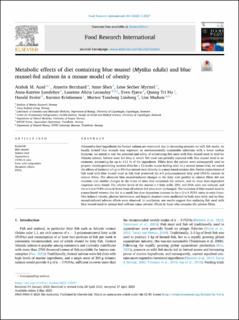| dc.contributor.author | Mahjour Azad, Atabak | |
| dc.contributor.author | Bernhard, Annette | |
| dc.contributor.author | Shen, Anne | |
| dc.contributor.author | Myrmel, Lene Secher | |
| dc.contributor.author | Lundebye, Anne-Katrine | |
| dc.contributor.author | Lecaudey, Laurene Alicia | |
| dc.contributor.author | Fjære, Even | |
| dc.contributor.author | Ho, Quang Tri | |
| dc.contributor.author | Sveier, Harald | |
| dc.contributor.author | Kristiansen, Karsten | |
| dc.contributor.author | Limborg, Morten Tønsberg | |
| dc.contributor.author | Madsen, Lise | |
| dc.date.accessioned | 2023-08-10T13:47:03Z | |
| dc.date.available | 2023-08-10T13:47:03Z | |
| dc.date.created | 2023-05-05T16:46:21Z | |
| dc.date.issued | 2023 | |
| dc.identifier.issn | 0963-9969 | |
| dc.identifier.uri | https://hdl.handle.net/11250/3083411 | |
| dc.description.abstract | Alternative feed ingredients for farmed salmon are warranted due to increasing pressure on wild fish stocks. As locally farmed blue mussels may represent an environmentally sustainable substitute with a lower carbon footprint, we aimed to test the potential and safety of substituting fish meal with blue mussel meal in feed for Atlantic salmon. Salmon were fed diets in which fish meal was partially replaced with blue mussel meal in increments, accounting for up to 13.1 % of the ingredients. Fillets from the salmon were subsequently used to prepare obesity-promoting western diets for a 13-weeks mouse feeding trial. In a second mouse trial, we tested the effects of inclusion of up to 8% blue mussel meal directly in a meat-based western diet. Partial replacement of fish meal with blue mussel meal in fish feed preserved the n-3 polyunsaturated fatty acid (PUFA) content in salmon fillets. The observed blue mussel-induced changes in the fatty acid profiles in salmon fillets did not translate into similar changes in the livers of mice that consumed the salmon, and no clear dose-dependent responses were found. The relative levels of the marine n-3 fatty acids, EPA, and DHA were not reduced, and the n-3/n-6 PUFA ratios in livers from all salmon-fed mice were unchanged. The inclusion of blue mussel meal in a meat-based western diet led to a small, but dose-dependent increase in the n-3/n-6 PUFA ratios in mice livers. Diet-induced obesity, glucose intolerance, and hepatic steatosis were unaffected in both mice trials and no blue mussel-induced adverse effects were observed. In conclusion, our results suggest that replacing fish meal with blue mussel meal in salmon feed will not cause adverse effects in those who consume the salmon fillets. | en_US |
| dc.description.abstract | Metabolic effects of diet containing blue mussel (Mytilus edulis) and blue mussel-fed salmon in a mouse model of obesity | en_US |
| dc.language.iso | eng | en_US |
| dc.publisher | Elsevier | en_US |
| dc.rights | Navngivelse 4.0 Internasjonal | * |
| dc.rights.uri | http://creativecommons.org/licenses/by/4.0/deed.no | * |
| dc.subject | Blue mussel | en_US |
| dc.subject | Salmon feed | en_US |
| dc.subject | Aquaculture | en_US |
| dc.subject | Fatty acid composition | en_US |
| dc.subject | Metabolic effects | en_US |
| dc.title | Metabolic effects of diet containing blue mussel (Mytilus edulis) and blue mussel-fed salmon in a mouse model of obesity | en_US |
| dc.title.alternative | Metabolic effects of diet containing blue mussel (Mytilus edulis) and blue mussel-fed salmon in a mouse model of obesity | en_US |
| dc.type | Journal article | en_US |
| dc.type | Peer reviewed | en_US |
| dc.description.version | publishedVersion | en_US |
| dc.rights.holder | © 2023 The Author(s). Published by Elsevier Ltd. This is an open access article under the CC BY license (http://creativecommons.org/licenses/by/4.0/). | en_US |
| dc.source.volume | 169 | en_US |
| dc.source.journal | Food Research International | en_US |
| dc.identifier.doi | 10.1016/j.foodres.2023.112927 | |
| dc.identifier.cristin | 2145908 | |
| dc.relation.project | Norges forskningsråd: 299554 | en_US |
| dc.relation.project | EC/H2020/817729 | en_US |
| cristin.ispublished | true | |
| cristin.fulltext | original | |
| cristin.qualitycode | 1 | |

